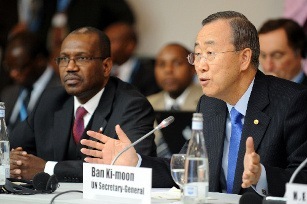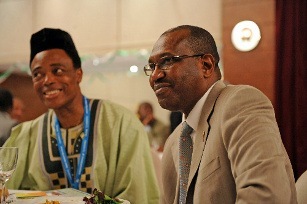At first glance, the imperative of broadband access for all may seem a less pressing challenge for Africa.
Improvements are so evidently needed in essential services such as sanitation, preventative medicine, clean water supplies, transport and power infrastructures. Ensuring the provision of voice, data and video simultaneously through high-capacity, always-on Internet access could appear neither relevant nor appropriate to many parts of Africa, a luxury in the face of so many urgent priorities, counter-intuitive in the search for solutions to drive social and economic development. However, broadband offers exactly that: a major enabler of social and economic change, a key driver of development from the technological top right down to an individual level, an efficient and proven force in increasing GDP per capita throughout the world.
Investment in rolling out a broadband network, whether fixed or mobile, brings in itself enormous economic benefits. This direct correlation between increased broadband penetration and economic growth has been the subject of much analysis. As cited by the ITU/UNESCO Broadband Commission’s latest report (Broadband: A Platform for Progress, June 2011), the European Commission, for example, estimates an increase in GDP of at least EUR 636bn and the creation of over two million jobs in Europe by 2015.
Driving economic growth

A study by international management consultancy McKinsey & Company concludes that “a 10 per cent increase in broadband household penetration delivers a boost to a country’s GDP that ranges from 0.1 per cent to 1.4 per cent”. For much of Africa, and in developing countries as a whole, the broadband boost to GDP calculated by the World Bank is 1.38 per cent, at the very upper end of this scale. This depth and breadth of existing analysis – which is expanding continually as the world catches on to connectivity as a driver of economic growth – provides indisputable evidence that investment in broadband infrastructure at a national level is not a nice-to-have or high-tech luxury, but an economic imperative.
The second major impetus to social and economic development is the range of content and applications enabled by broadband and its simultaneous, always-on provision of voice, data and video services. For example, broadband technology is behind grid computing, enabling thousands of small computers to jointly analyse huge volumes of data; it powers smart grids to control electricity supplies more accurately, and it enables climate monitoring to provide advance warning of natural disasters such as floods or famines.
Other advantages are seen in key areas of health and education. Telemedicine offers medical advice, monitoring, diagnosis and training through broadband, delivered to the remotest regions over wireless networks, sensitive to specific local needs and immediate crises and opening up Africa to a welcome increase in the provision of basic medical services. Broadband is also essential in training medical staff and education professionals, reaching numbers that have proved unobtainable by traditional methods. E-education covers basic primary schooling through all levels to teacher training and academic research, with enormous potential for geographic reach and return on investment for Africa now and in the digital future.
Championing connectivity

Founded by ITU and UNESCO in 2010, the Broadband Commission was established to face these challenges and champion connectivity as a key force for social and economic growth. Comprising government leaders from around the world and the highest level representatives of relevant industries, international agencies and development organisations, the Commission is unique in its ability to coordinate a trans-sectoral approach across government, industry, administration and the economy. This focus avoids the inefficiency of isolated or duplicated projects, and provides major multiplier benefits in education, healthcare, energy efficiency, environmental protection, civic participation and economic growth.
The Commission’s Broadband Leadership Summit is taking place at ITU Telecom World 2011 and will comprise of a series of highest level meetings bringing together Head of State and Governments, members of the ITU/UNESCO Broadband Commission for Digital Development and other key players to discuss today’s global and regional issues relating to broadband.
By reaping the benefit of broadband infrastructure and its content and applications, Africa can reach a new, connected future, where technology can propel developing nations forward in a leap, not a crawl – and turn a profit in the process.
Brahima Sanou, Director of the ITU Telecommunication Development Bureau
References:
All figures taken from Broadband: A Platform for Progress, a report by the Broadband Commission for Digital Development (June 2011), available online at: http://www.broadbandcommission.org/report2/full-report.pdf
For more information on ITU’s BDT see http://www.itu.int/net/ITU-D/index.aspx
ITU Telecom World 2011 is a unique gathering of Heads of State & Government, leading industry players, representatives of global cities, digital innovators, technological visionaries, media and analysts, focused together on applying the power of technology to real-world issues. It takes place in Geneva, Switzerland from 24-27 October 2011. For more info visit www.itu.int/world2011





















